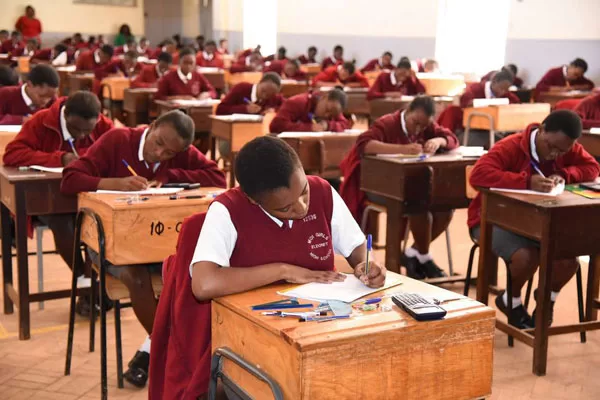2024 KCSE Results to Be Released Today, Ministry of Education Confirms.
The 2024 Kenya Certificate of Secondary Education (KCSE) candidates are set to receive their results today, Thursday, January 9. This announcement marks a significant moment for the 965,501 students who participated in the examinations.
The Cabinet Secretary for Education, Julius Ogamba, will release the results from the Kenya National Examinations Council (Knec) headquarters at Mitihani House in Nairobi. Prior to the announcement, senior officials from the Ministry of Education will follow protocol by briefing President William Ruto at State House this morning.
President Ruto returned to the country last night following official visits to Ghana and Angola. His arrival cleared the way for the planned release of the KCSE results, a process that had been awaiting his return.
Julius Ogamba had earlier assured that the KCSE results would be made public within the first two weeks of January. While reports for the Kenya Primary School Education Assessment (KPSEA) were uploaded on Tuesday, the KCSE results were held back until the President was briefed.
The Kenya National Examination Council (Knec) convened on Tuesday before briefing Education Cabinet Secretary (CS) Julius Ogamba. These meetings prepared the ground for the release of the Kenya Primary School Education Assessment (KPSEA) results for grade six learners.
In December last year, CS Ogamba affirmed that the 2024 KCSE results would be unveiled within the first two weeks of January, aligning with the traditional January release timeline. He noted during a visit to Kisii that this practice would be maintained.
The team intends to meet President William Ruto after his return from Ghana, with expectations that the results could be announced as early as today. These results signify the conclusion of the 2024 KCSE cohort’s secondary school education, a journey marked by numerous setbacks.
The Missing Candidates and Transition Policy Challenges
As the results are awaited, a concerning revelation has emerged: over 200,000 students who completed primary school four years ago did not sit for the 2024 KCSE exam. This exposes challenges in the government’s 100 per cent transition policy.
While the policy mandates that all Kenya Certificate of Primary Education (KCPE) candidates transition to secondary school, the statistics reveal a declining trend.
In 2020, 1,179,192 candidates took the KCPE exams, but only 965,501 appeared for the KCSE exams last year, leaving 213,691 students unaccounted for. This marks the sharpest decline since the policy’s introduction in 2018 and raises questions about its efficacy.
The figures suggest significant attrition, which dents the policy initiated by former President Uhuru Kenyatta.
The 2024 KCSE cohort also represents a milestone in the phase-out of the 8-4-4 education system. Following their exit, only three classes will remain under this outgoing curriculum in secondary schools. For this cohort, their secondary education began in 2020 amidst the challenges posed by the COVID-19 pandemic.
Pandemic and Calendar Disruptions
In March 2020, schools closed abruptly due to the pandemic, forcing students into an eight-month hiatus until November. Consequently, this cohort’s KCPE exams were delayed until 2021, disrupting their educational timeline.
The compressed curriculum and high-pressure environment that followed were part of the efforts to recover lost time. By 2023, schools had restored the academic calendar to its usual January-December cycle, with the Ministry of Education declaring that the time lost had been fully recovered.
Read Also: Backlash as St. Anne’s Students Locked Out of School Overnight Over Arrears
Despite these efforts, the candidates faced additional disruptions in 2024. In April, heavy rains and floods extended school holidays by two weeks, cutting the second term from 13 weeks to 11.
Although stakeholders pushed for an extended term to recover lost time, the Ministry of Education opted for alternative measures such as remedials, morning, and evening classes.
Later in the year, protests against the Finance Bill 2024 disrupted learning further. Dubbed the “Gen Z protests,” the unrest led to early midterm breaks in some schools, with others extending these breaks to a week.
Additionally, a teachers’ strike in August further shortened the academic calendar, reducing the third term from nine weeks to eight.
Call for Alternative Learning Solutions
Stakeholders, including the Kenya Union of Post Primary Education Teachers (KUPPET), have expressed concerns over the lack of robust remote learning infrastructure to ensure continuity during disruptions.
Akello Misori, a union official, suggested that effective out-of-class solutions should be developed to address future disruptions. He noted that the lack of such infrastructure has repeatedly left students without learning alternatives during school closures.
The culmination of these challenges underscores the resilience of the 2024 KCSE candidates, who navigated a turbulent academic journey shaped by external disruptions and systemic inadequacies.
2024 KCSE Results to Be Released Today, Ministry of Education Confirms.
Follow Teachers Updates on Facebook, LinkedIn, X (Twitter), WhatsApp, Telegram, and Instagram. Get in touch with our editors at [email protected].


Discussion about this post